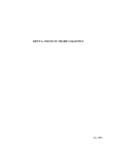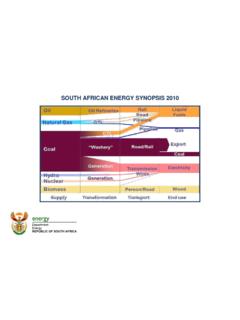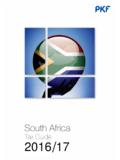Transcription of South Africa: Transition to Democracy Offers …
1 ISSN 1608-7143. OECD JOURNAL ON BUDGETING. Volume 6 No. 2. OECD 2006. South Africa: Transition to Democracy Offers Opportunity for Whole System Reform by Alta F lscher and Neil Cole*. This case study considers the substantial reforms to the South African public expenditure management system undertaken since the mid-1990s. The key aspects of the reform process have been: establishing the institutional framework for budget reforms through the new Constitution and further national legislation and practice; adopting a multi-year budget framework and top-down budget process; developing a framework for public financial management and reporting; improving the classification system of public finances; and creating a performance-oriented public service.
2 South Africa has successfully implemented a number of these reforms and has radically altered the way in which it budgets for public services and how it accounts for public expenditure and commitments. The case study concludes by drawing on the lessons learned through this process. * Alta F lscher is an independent public finance researcher and consultant. She has worked in Africa, South , South -East and Central Asia, the Caribbean, the Balkans, Eastern Europe and the Middle East on issues of public expenditure management, public policy and governance. She is the editor of the first two post-seminar resource volumes published by CABRI. Neil Cole is Chief Director of Expenditure Planning in the Budget Office Division, South African National Treasury.
3 1. South AFRICA: Transition TO Democracy Offers OPPORTUNITY FOR WHOLE SYSTEM REFORM. 1. Introduction The 1994 Transition to a democratic state brought many challenges for managing the public finances in South Africa. Not only did the new constitutional dispensation lay down a changed structure and distribution of power in the state, with implications for the way in which public funds were allocated and used, but the new government had a critical political commitment to improve the coverage and quality of public service delivery to the majority of the population, in order to redress the racially based distortions of the The new government did not start with a clean fiscal slate. In the 1992/93. fiscal year, the main budget net borrowing requirement had reached of GDP, and in the 1994/95 fiscal year, public debt rose to almost 47% of GDP (from a level of approximately 30%, ten years earlier), leaving very little fiscal room for the state to improve the equity of public services.
4 The annual budgeting system the new government inherited provided inadequate tools with which to stabilise fiscal balances and manage the required policy shifts. It was highly fragmented, not only in terms of a de-linking of policy, budgeting and implementation, but also institutionally, increasing budgeting uncertainty, lack of clarity and the scope for budget games. It planned and controlled for inputs and cash, with limited opportunity for systematic assessment of the effectiveness and efficiency of spending, or for relating allocations directly to policy. It was not transparent, with poor underlying information systems, hidden spending and inadequate mechanisms to extract good information for use in the budget process and for accountability purposes.
5 The budget process itself was largely incremental, offering insufficient opportunity for the new government to identify ongoing non-priority activities and create fiscal room for higher priorities. Accountability was procedural, and the system was plagued by deeply entrenched inefficiencies. In short, what was required was an overhaul of the system of budget management, not only to fulfil the demands of the new constitutional framework, but also as a tool to bring about the improved substantial outcomes sought in terms of fiscal sustainability, improved alignment of spending with the new national priorities and the maximisation of existing resources towards these priorities. The South African public expenditure management system has undergone substantial reform since the mid-1990s.
6 While the early reforms 2 OECD JOURNAL ON BUDGETING VOLUME 6 No. 2 ISSN 1608-7143 OECD 2006. South AFRICA: Transition TO Democracy Offers OPPORTUNITY FOR WHOLE SYSTEM REFORM. shaped macroeconomic stability and strengthened public spending, the more recent emphasis of the reform programme has been on efficient resource allocation and effective service delivery. The highlights of the reform programme have been: the roll-out of a new intergovernmental system that requires all three levels of government to formulate and approve their own budgets; the introduction of three-year rolling spending plans for all national and provincial departments under the Medium-term Expenditure Framework (MTEF); new formats for budget documentation that include a strong focus on service delivery information; and the enactment of new financial legislation.
7 In addition, changes to the budget process have allowed role players to deliberate on key policy choices and on the matching of available resources to plans, rather than item-by-item cost estimates. Underlying the reforms were the following principles: Comprehensiveness and integration. The main national budget framework co-ordinates, integrates and disciplines policy and budget processes for the country at national, provincial and, increasingly, at local level. Political oversight and a focus on policy priorities. Choices between priorities are political in the final instance. The South African system rec ogn is es this and stru ctures the in teg ration of pol itical and administrative practices to ensure that funding choices align with the priorities of government, and that political oversight is reinforced.
8 Using information strategically. The reform process systematically sets out to improve the timeliness, quality and usefulness of information on the allocation and use of funds, both internally and externally, to improve public policy and funding choices and to enable accountability. Changing behaviour by changing incentives. Responsibility was devolved to spending departments for spending choices and use of funds within approved ceilings and against policy commitments. Ensuring budget stability and predictability while facilitating change at the margin. The budget process includes various mechanisms to manage uncertainty and maximise funding and policy predictability over the medium term, while promoting alignment with policies at the margin, through the use of rolling baselines, a contingency reserve and a disciplined budget process, amongst other measures.
9 These principles, applied throughout the institutional arrangements of the budget process from preparation to audit, put in place a changed set of incentives for budgetary actors, reducing the potential for budgeting games and improving planning practices to align policy with budgets and actual spending. A key aspect of these arrangements is the recognition that, while the quality of budgetary estimates is important for the eventual policy outcomes, the process by which they are derived should carry equal weight in OECD JOURNAL ON BUDGETING VOLUME 6 No. 2 ISSN 1608-7143 OECD 2006. 3. South AFRICA: Transition TO Democracy Offers OPPORTUNITY FOR WHOLE SYSTEM REFORM. reform design. Similarly, while the technical information systems are important to support financial management practices, good budget implementation is about getting the institutions right.
10 In fact, it can be argued that the South African reforms placed emphasis in the early years on getting a functional budgetary process in place (involving all relevant, and not just financial, decision makers, and changing incentives to change behaviour). rather than on attempting to formulate budget estimates that were technically the best expression of policies and/or expenditure realities. The budget reform process is still underway. In some ways it will never be complete, since the budgeting system would always need to be responsive to changing circumstances and demands. However, there are remaining budget reform challenges that have not been addressed adequately yet, and also some persistent weaknesses in the system, which the current institutional arrangements have not overcome.
















